中国四大鬼节之一 七月半或中元节英语介绍
写中国鬼节英文作文
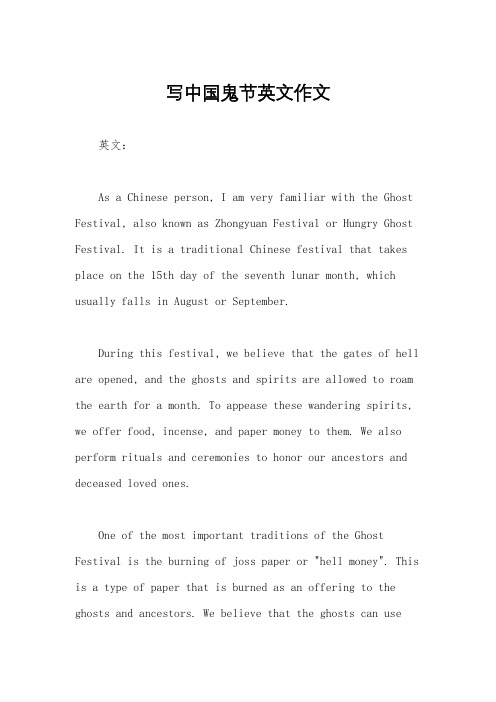
写中国鬼节英文作文英文:As a Chinese person, I am very familiar with the Ghost Festival, also known as Zhongyuan Festival or Hungry Ghost Festival. It is a traditional Chinese festival that takes place on the 15th day of the seventh lunar month, which usually falls in August or September.During this festival, we believe that the gates of hell are opened, and the ghosts and spirits are allowed to roam the earth for a month. To appease these wandering spirits, we offer food, incense, and paper money to them. We also perform rituals and ceremonies to honor our ancestors and deceased loved ones.One of the most important traditions of the Ghost Festival is the burning of joss paper or "hell money". This is a type of paper that is burned as an offering to the ghosts and ancestors. We believe that the ghosts can usethis money in the afterlife, and it will bring them good luck and prosperity.Another tradition is the performance of Chinese opera or "ghost plays". These plays are performed on makeshift stages in the streets and parks, and they tell stories of ghosts and spirits. It is believed that these performances can entertain and appease the wandering spirits.中文:作为一个中国人,我非常熟悉鬼节,也被称为中元节或者盂兰盆节。
中元节英语作文120

中元节英语作文120Title: The Hungry Ghost Festival: A Cultural Insight。
The Hungry Ghost Festival, also known as Zhongyuan Festival, is a traditional Chinese festival celebrated on the fifteenth day of the seventh lunar month. It holds significant cultural and religious importance in Chinese communities worldwide. This festival is an intriguing blend of Buddhist and Taoist beliefs, steeped in rich traditions that have been passed down through generations.During the Hungry Ghost Festival, it is believed that the gates of the underworld are opened, allowing spirits and ghosts to roam freely on Earth. These spirits include deceased ancestors as well as wandering souls who have no living relatives to pay homage to them. To appease these restless spirits and ward off misfortune, various rituals and customs are observed.One of the most common customs during the Hungry GhostFestival is the offering of food and incense to the spirits. Families set up elaborate altars in their homes or at makeshift shrines in public spaces, adorned with fruits, desserts, and other delicacies. Incense sticks are lit to guide the spirits to the offerings and to create a fragrant atmosphere. It is believed that by providing these offerings, the living can gain the favor of the spirits and receive blessings in return.Another significant aspect of the Hungry Ghost Festival is the performance of traditional Chinese operas and puppet shows. These performances, known as "Yueju" or "Gezaixi," are staged in open-air theaters or temples throughout the month. The purpose of these shows is not only to entertain the living but also to entertain and appease the wandering spirits. It is believed that by enjoying these performances, the spirits will feel content and less likely to cause mischief among the living.Furthermore, the Hungry Ghost Festival is marked by the burning of joss paper, also known as "ghost money." Joss paper comes in various forms, including fake currency,houses, cars, and other worldly possessions. These items are burned as offerings to the deceased, symbolizing wealth and comfort in the afterlife. It is believed that the smoke from the burning joss paper carries these offerings to the spirit world, where they can be enjoyed by the departed.In addition to these customs, the Hungry Ghost Festival also includes the practice of releasing lanterns and floating candles on bodies of water. This act symbolizes guiding lost souls to the afterlife and represents the hope for a better future for both the living and the dead.Overall, the Hungry Ghost Festival is a time for reflection, remembrance, and reverence for the departed. It is a testament to the rich cultural heritage of the Chinese people and serves as a reminder of the importance of honoring one's ancestors and maintaining spiritual connections. Through its rituals and traditions, the Hungry Ghost Festival continues to be celebrated with great fervor and reverence by Chinese communities around the world.。
中元节英语作文60词
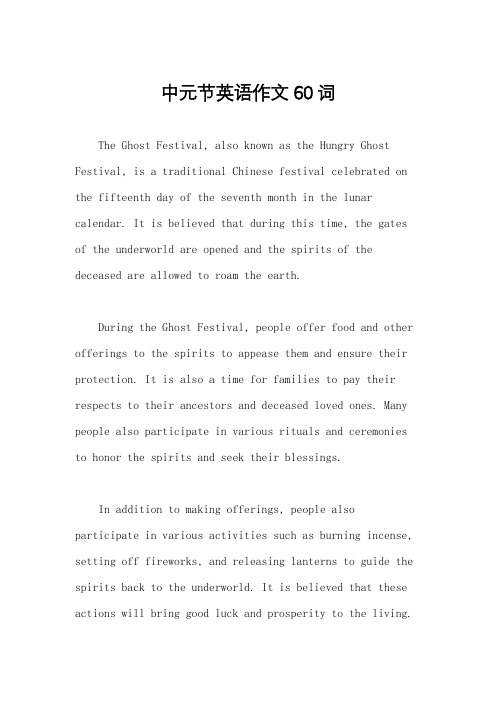
中元节英语作文60词The Ghost Festival, also known as the Hungry Ghost Festival, is a traditional Chinese festival celebrated on the fifteenth day of the seventh month in the lunar calendar. It is believed that during this time, the gates of the underworld are opened and the spirits of the deceased are allowed to roam the earth.During the Ghost Festival, people offer food and other offerings to the spirits to appease them and ensure their protection. It is also a time for families to pay their respects to their ancestors and deceased loved ones. Many people also participate in various rituals and ceremonies to honor the spirits and seek their blessings.In addition to making offerings, people also participate in various activities such as burning incense, setting off fireworks, and releasing lanterns to guide the spirits back to the underworld. It is believed that these actions will bring good luck and prosperity to the living.Overall, the Ghost Festival is a time for reflection, remembrance, and honoring the spirits of the deceased. It is a solemn and important occasion in Chinese culture that is celebrated with reverence and respect.。
中元节英语怎么说
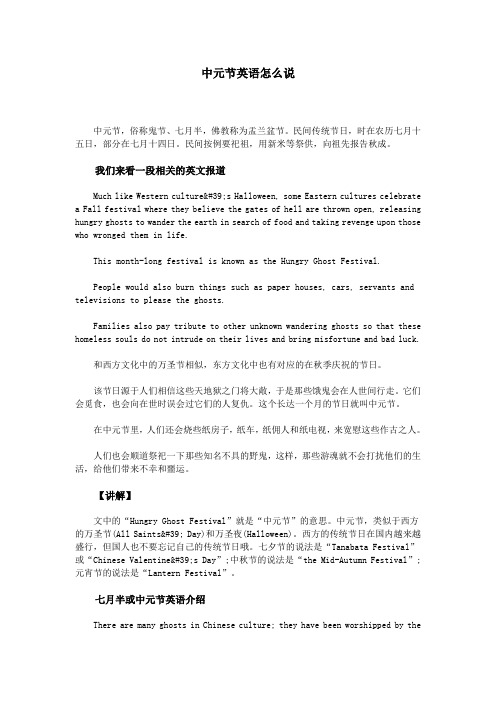
中元节英语怎么说中元节,俗称鬼节、七月半,佛教称为盂兰盆节。
民间传统节日,时在农历七月十五日,部分在七月十四日。
民间按例要祀祖,用新米等祭供,向祖先报告秋成。
我们来看一段相关的英文报道Much like Western culture's Halloween, some Eastern cultures celebrate a Fall festival where they believe the gates of hell are thrown open, releasing hungry ghosts to wander the earth in search of food and taking revenge upon those who wronged them in life.This month-long festival is known as the Hungry Ghost Festival.People would also burn things such as paper houses, cars, servants and televisions to please the ghosts.Families also pay tribute to other unknown wandering ghosts so that these homeless souls do not intrude on their lives and bring misfortune and bad luck.和西方文化中的万圣节相似,东方文化中也有对应的在秋季庆祝的节日。
该节日源于人们相信这些天地狱之门将大敞,于是那些饿鬼会在人世间行走。
它们会觅食,也会向在世时误会过它们的人复仇。
这个长达一个月的节日就叫中元节。
在中元节里,人们还会烧些纸房子,纸车,纸佣人和纸电视,来宽慰这些作古之人。
浅析如何用英文讲述中元节起源与习俗

浅析如何用英文讲述中元节起源与习俗今天是农历七月十五日,恰好是“中元节”,俗称鬼节,那你知道如何用英文讲述中元节的来源与习俗吗?中文大家肯定都知道,今天小编在此与大家分享如何用英文讲述中元节的来源与习俗,大家不妨来了解下中英对照吧。
【词汇】Hungry Ghost Festival 中元节(也叫“鬼节”)The Hungry Ghost Festival is celebrated on the 15th day of the seventh lunar month.中元节在农历七月十五日。
【中元节的起源】The origin of the Hungry Ghost Festival and the Ghost Month in China is uncertain. Cultures in Asia from India to Cambodia to Japan share similar beliefs about the month, and these traditions seem to date from before Buddha.中元节是否起源于中国并不确定。
关于该节日的文化在一些亚洲国家诸如印度、柬埔寨、日本都信奉着相似的信仰,似乎这些传统都起源于佛教。
According to Taoism, the gates of hell are opened on the first day of the seventh month, and hungry ghosts are released to find food or to take revenge on those who have behaved badly according to Taoist records.根据道教说法,农历七月的第一天地狱之门将打开,饥饿的鬼魂得以释放去寻找食物或报复那些道家记载的作恶多端的人。
【中元节习俗】Family members offer prayers to their deceased relatives, offer food and drink and burn hell bank notes and other forms of joss paper.家庭成员向已故的亲人祈祷,送上祝福,奉上食物和饮料,烧一些诸如冥币这样的纸钱给他们。
中元节(中国的鬼节)的英文介绍
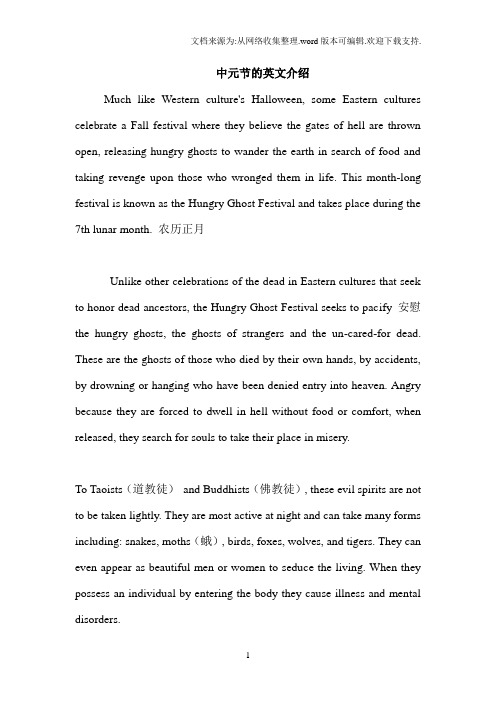
中元节的英文介绍Much like Western culture's Halloween, some Eastern cultures celebrate a Fall festival where they believe the gates of hell are thrown open, releasing hungry ghosts to wander the earth in search of food and taking revenge upon those who wronged them in life. This month-long festival is known as the Hungry Ghost Festival and takes place during the 7th lunar month. 农历正月Unlike other celebrations of the dead in Eastern cultures that seek to honor dead ancestors, the Hungry Ghost Festival seeks to pacify 安慰the hungry ghosts, the ghosts of strangers and the un-cared-for dead. These are the ghosts of those who died by their own hands, by accidents, by drowning or hanging who have been denied entry into heaven. Angry because they are forced to dwell in hell without food or comfort, when released, they search for souls to take their place in misery.To Taoists(道教徒)and Buddhists(佛教徒), these evil spirits are not to be taken lightly. They are most active at night and can take many forms including: snakes, moths(蛾), birds, foxes, wolves, and tigers. They can even appear as beautiful men or women to seduce the living. When they possess an individual by entering the body they cause illness and mental disorders.Throughout this month, to keep the angry spirits amused, people stage street operas and other forms of public entertainment. In the past, people did not view the street operas as they were performed only for ghosts. Other rituals(典礼,仪式)are performed to help souls enter into heaven. Taoists do their best to avoid late nights away from these amusements and rituals to steer clear of the evil spirits. To appease these wandering spirits, Buddhists and Taoists burn bundles of joss sticks, paper hell money, food, and other offerings by the roadside. Communities along rivers or near the sea float lanterns in the shape of the lotus or carved from fruit or gourds in the water to guide them away from their homes. They follow the lanterns from the river bank or sea shore till they can no longer be seen. This is done to redeem the soul of those who died by drowning.The most important days of this month are the 14th and 15th, the days of the great feasts. On the 14th, a great feast would be held to honor family ancestors. Prayers and offerings would be made at family altars. On the following night, the 15th, they would feast for the hungry ghosts. Held outside under the full moon, these feasts feed the evil spirits so that they will leave the living alone and bribe(贿赂)the ancestors for luck with money and the harvest.农历的七月十五日是什么日子?In Chinese tradition, the fifteenth day of the seventh month in the lunar calendar is called Ghost Day and the sev enth month in general is regarded as the Ghost Month, in wh ich ghosts and spirits, including those of the deceased anc estors, come out from the lower realm。
双语:中国四大鬼节之一七月半或中元节英语介绍

双语:中国四大鬼节之一七月半或中元节英语介绍万圣节是西方的鬼节,那你知道中国的四大鬼节是那四个节日吗?今天介绍中国四大鬼节之一七月半,俗称鬼节,又称中元节或盂兰盆节。
民间有阳间过元宵节阴间过鬼节的传说,因此鬼节是阴间最大的节日。
你知道怎样向外国朋友介绍中国的鬼节吗?随小编一起来看看吧!There are many ghosts in Chinese culture; they have been worshipped by the Chinese for a few thousand years. Even Confucius said, "Respect ghosts and gods, but keep away from them."While many people believe in ghosts, there are others who don't. The Chinese people often say, "If you believe it, there will be, but if you don't, there will not."The ghost is a classical image in Chinese culture, i.e., the young woman whose face is covered by long black hair, who dies due to misfortune, then comes back for revenge.The word "ghost" for many Chinese conjures up similar images. Often the ghost is a beautiful young woman. The sudden switch from a beautiful girl to a frightening ghost is striking. The seemingly fragile, helpless and beautiful women turning into fearless killers is a favorite theme among Asian movie directors and storywriters.Chinese Ghost FestivalJust as the West features Halloween for ghosts and ghouls, the Chinese have a holiday to honor the departed spirits of the underworld -- the Chinese Ghost Festival. It is said that ghosts roam the world every year for one lunar month. In some areas of China, visitors can see small roadside fires, where believers burn paper money and other offerings to appease the restless spiritsthat have temporarily been released from Hades.The Chinese Ghost Festival is also called "Half July" (Lunar). It is a popular occasion celebrated throughout China on the 15th day of the seventh lunar month.Historically, families offer sacrifices of the newly harvested grain to departed ancestors on this day, which also coincides with the Buddhist Ullambana (Deliverance) Festival and the Taoist Chinese Ghost Festival. Since each of these traditions in some way honors the spirits of the departed, the seventh lunar month has come to be known as "Ghost Month" and is a time when the "Good Brethren" (ghosts from the underworld) come back to earth to feast on the victuals offered by the living. Over time the Ullambana Festival and Ghost Festival have melded together to become the present-day Chung Yuan Putu or "Mid-origin Passage to Universal Salvation."The Chinese believe that the dead become ghosts between heaven and earth. Spirits without descendants to care for them are summoned during the Ghost Festival so that they may also enjoy the warmth of life among the living. This custom -- an extension of the traditional Chinese ethic of "universal love" -- has been woven together with the didactic legend, "Moginlin Saving His Mother From Hades." It lends the Ghost Festival a positive spin as a time for remembering the importance of filial piety. People now have inherited releasing river light as an important activity. It is said that river light can comfort and warm homeless ghosts.Burial of the deadIn the past, the burial of the dead (cremation is traditionally uncommon) was a matter taken very seriously in Chinese society. Improper funeral arrangements could wreak ill fortune anddisaster upon the family of the deceased.To a certain degree, Chinese funeral rites and burial customs were determined by the age of the deceased, the manner of his/her death, his/her status and position in society and his/her marital status.According to Chinese custom, an older person should not show respect to someone younger. Thus, if the deceased was a young bachelor his body could not be brought home but was left at the funeral parlor and the parents could not offer prayers for their son. Since the deceased was unmarried he had no children to perform the rites, which was why the body did not enter the family home. If a baby or child died no funeral rites were performed since respect could not be shown to a younger person. The child was, therefore, buried in silence.Chinese funeral rites for an elderly person must follow the prescribed form and convey the relevant rites that befit the person.Chinese thoughts towards life after deathYoung women in traditional societies are rarely endowed with much power, and malignant powers are only summoned with keen hatred and a desire for revenge. The more badly one is wronged, the more powerful he or she becomes after death.Such beliefs are closely related to the Chinese attitude towards life after death -- a combination of superstition and religion.Buddhist doctrines about the life cycle led to many vivid descriptions in Chinese legends about karma. For example, Buddhism forbids murder; in folklore, people believe that butchers return in the next life in the form of the animals they killed. People who treat others badly or do cruel things becomepathetic beings, suffering for the rest of the next life.Besides retribution in lives to come, vivid and complicated descriptions of heaven and hell also exist in Chinese legends.People have imaginatively transfigured their real life experiences into visions of the unknown world. The Chinese legendary hell, for example, is governed by a king in a completely bureaucratic system.The king of the underground takes charge of people's lives, keeping a book that spells out the exact time of everybody's death.In the classic novel, Pilgrimage to the West, the Monkey King Wu Kong goes to visit the king of hell and reads the book of death. He looks for his own name and erases it, ensuring himself everlasting life.。
中元节英文介绍

中元节英文介绍The Mid-Autumn Festival, also known as Zhongqiu Festival in Chinese, is a traditional Chinese festival that is held on the 15th day of the 8th lunar month, which usually falls in September or early October. It is a time for family reunions and the celebration of harvest.The festival has a long history, dating back more than 3,000 years. It was originally a harvest festival, where people would give thanks for the good harvest and pray for a better future. The festival is also closely associated with the moon and its worship. The full moon during the Mid-Autumn Festival is considered to be the brightest and roundest of the year, symbolizing unity and completeness.One of the most important traditions of the Mid-Autumn Festival is the eating of mooncakes. Mooncakes are round pastries filled with various sweet or savory fillings, such as lotus seed paste, red bean paste, or egg yolk. They are usually enjoyed with a cup of tea or a glass of wine. In addition to mooncakes, people also enjoy fruits, nuts, and other traditional delicacies during the festival.Another popular activity during the Mid-Autumn Festival is lantern making and lantern parades. Children and adults alike enjoy making and decorating lanterns in various shapes and sizes. These lanterns are then displayed and paraded in the streets at night, creating a colorful and festive atmosphere.During the festival, families and friends also gather to appreciate the moon. They sit outside, often on rooftops or in gardens, andadmire the beauty of the moon while enjoying mooncakes and tea. In some regions, there are even special performances, such as traditional dragon and lion dances, to entertain the crowds.The Mid-Autumn Festival is not only celebrated in China, but also in other East Asian countries such as Vietnam, Korea, and Singapore. Each country has its own unique customs and traditions, but the essence of the festival remains the same - to celebrate the harvest, give thanks, and enjoy the company of loved ones.In recent years, the Mid-Autumn Festival has gained popularity worldwide. It has become a time for cultural exchange and celebration, with people from different cultures and backgrounds coming together to experience and share the joy of this ancient festival.In conclusion, the Mid-Autumn Festival is a time for family reunions, the celebration of harvest, and the worship of the moon. It is a festive occasion filled with delicious food, colorful lanterns, and the company of loved ones. Whether you are in China or anywhere else in the world, the Mid-Autumn Festival is a time to come together and appreciate the beauty of nature and the blessings of life.。
鬼节的英文介绍
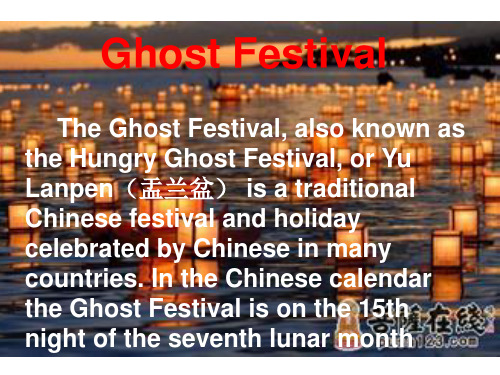
5. 5.buying and releasing miniature(微型) paper boats and lanterns on water, which signifies giving directions to the lost ghosts and spirits of the ancestors and other deities(神灵).
Ancestor worship is what distinguishes Qingming Festival from Ghost Festival because the latter includes paying respects to all deceased, including the same and younger generations, while the former only includes older generations.
Ghost Festival
The Ghost Festival, also known as the Hungry Ghost Festival, or Yu Lanpen(盂兰盆) is a traditional Chinese festival and holiday celebrated by Chinese in many countries. In the Chinese calendar the Ghost Festival is on the 15th night of the seventh lunar month
2.
Official name
• Buddhism: Ullambana (TC: 盂蘭盆, SC: 盂兰盆Yúlánpén) • Taoism and Folk Belief: Zhōngyuán Jié (TC: 中元節, SC: 中元节) • Also called Ghost Month
Hungry Ghost Festival 鬼节 英语 节日介绍
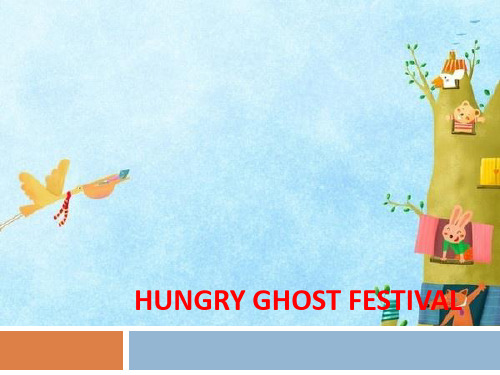
Story of the Origin
There is a monk named Mulian , his mother has fallen to Hungry Ghosts Tao, the food will be turned into a flame as soon as she swallowed , endure hunger all day and all night, Mulian was unable to save his mother, then turn to the Buddha for help, the Buddha gave him a Mulanpen scripture, turned him to Yulan Basin to save his mother on July fifteenth . In order to commemorate the monk.We will have Hungry Ghost Festival that day
Some superstitions
No swimming
No marriages No flames Children are advised to return home early and not to wander around alone at night
That’s the end of the introduction of the Ghost Festival.
Difference between Qingming Festival and Ghost Festival
In Chinese tradition, the fifteenth day of the seventh month in the lunar calendar is called Ghost Day and the seventh month in general is regarded as the Ghost Month , in which ghosts and spirits, including those of the deceased ancestors, come out from the underworld. On Qingming Festival ,living descendants pay homage to their deceased ancestors, on Ghost Day, the deceased are believed to visit the living.
中元节英文介绍(两篇)

中元节英文介绍(两篇)中国的鬼节是中元节哦,过惯了西方万圣节的同学们,不妨一起来过一过中国的鬼节吧!下面是由作文网为您准备的两篇《中元节英文介绍》。
篇一:中元节英文介绍Begins in the name of "yuan" in the northern wei dynasty, is the view of Taoism. According to ancient books: it is on the fifteenth day of the "has", as the cheongwan blessed day; In July 15 is "yuan", for the officer to forgive SINS; October 15 is "yuan" for urban water officer solution. According to the practice to record "records:" ganjitsu in July, the land officer, the world of good and evil, Taoist and night chanting, hungry section prisoner may also liberation." Therefore, in the July 15 this day, folk will prepare rich offering, officer emperor and ancestor worship.Hungry ghost festival is a combination of Taoism and Chinese traditional folk, the corresponding, mainly based on the same world view: heaven, earth, water, permeating the godhead into cheongwan, officer, officer of water permeating the governance by the government agency. Folk known as "three worlds", is in three officer refers to three of the gods.Chinese eastern han dynasty last years, the documents has comprehensive Taoist cosmology, and before the first ever to be on the "three officer calligraphy", respectively, into the heaven, earth, water, and said to three officer sin, repentance to pray for peace. After the development of the six dynasties period, combined with the three days and three yuan in the tang dynasty to the promotion of the official, has, in the yuan, the yuan, and so on three ganjitsu standard, be blessed, najib, ancestor worship, three yuan festival to worship, the emperor rate officials toparticipate in the festival ceremony. After the tang, song, three ganjitsu become a folk festival.The hungry ghost festival, daoist temples, such as outside the gates of fire temples, XiBianMen baiyunguan temple and so on in order to pray the good crop weather, peaceful country and safe people routinely held "blessing propitious dojo" every year. Because of the psychological fear him, people in the daily life of composite of Confucianism, Buddhism, Taoism, the lunar July 15 of the hungry ghost festival known as the ghost festival, called the lunar July "ghost month".After the introduction of Buddhism, Buddhism also has a prayer ancestors, known as the "house," Lamar quin had gone words ULLAMBANA (India), namely "Meng Lan basin will". Meng Lan basin is the meaning of abuse, the pain of life is like a bat hangs on the tree, hanging, suffering. In order to make the living beings from suspension, then need to chant, cloth off food to the wandering soul wild ghost. The move coincided with the Chinese ghost month, worship, and Buddhism is the lunar July 15 turn undead will held on this day, so hungry ghost festival and Meng Lan will come down at the same time.篇二:中元节英文介绍July 15 inclusive festival customs is more complex, is commonly known as the ghost festival, folk and Taoist hungry ghost festival, is also a buddhist obon, is a way, the monk, festival vulgar third-rate unity.According to legend, every year from July 1st lunar month, yama ordered big open the gates of hell, let those who suffer imprison all year round in the ghosts of hell spectre, out of the hell, for short-term wandering, enjoy food, human blood so known as the ghost month, July 14th of July is the day of ghostsdoor open, July 15 is Halloween.According to the logic of Taoism culture, three basic elements, think of all things to feed the world is heaven, earth, water, will be the first half of the year as cheongwan, in the second half is officer. That day to xuan xuan, day, ground water, all things, water is the foundation of the creatures. Taoism virtual cheongwan, three officer, officer, officer of water cheongwan blessed, to forgive SINS, solution of urban water officer. The officer is the jade emperor in the representative of the world, every year to visit the world of good and evil, upward reporting day. Third officer on the 15th, July 15, October 15 for birthday, respectively called has these three days, in dollars and RMB. Call in the July 15 yuan, on this day, to academy is a record of SINS, he took a thick roster, according to the performance of gods, human, animal, award of rewards and punishments, exempt from punishment of SINS. "Hungry ghost festival" reward good and punish the bad not only, also encourage the sin of SINS, who have sin in the hungry ghost festival in a year this day through a variety of yili to accommodate yourself and request of forgiveness.。
2016年托福词汇趣味学习:盂兰盆节英文介绍
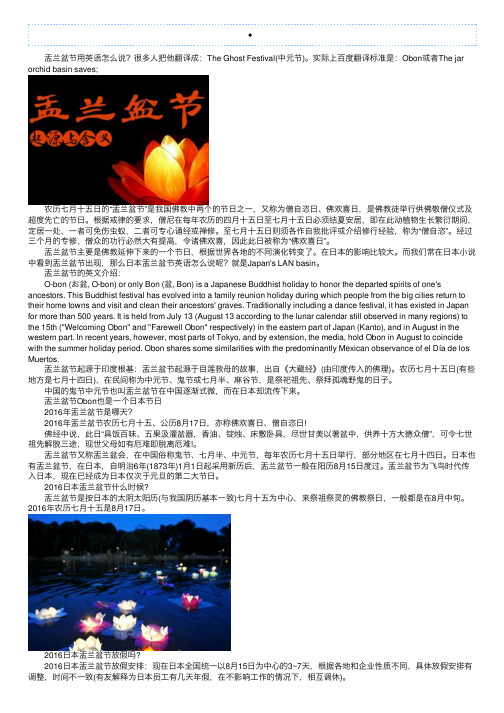
盂兰盆节⽤英语怎么说?很多⼈把他翻译成:The Ghost Festival(中元节)。
实际上百度翻译标准是:Obon或者The jar orchid basin saves; 农历七⽉⼗五⽇的“盂兰盆节”是我国佛教中两个的节⽇之⼀,⼜称为僧⾃恣⽇、佛欢喜⽇,是佛教徒举⾏供佛敬僧仪式及超度先亡的节⽇。
根据戒律的要求,僧尼在每年农历的四⽉⼗五⽇⾄七⽉⼗五⽇必须结夏安居,即在此动植物⽣长繁衍期间,定居⼀处,⼀者可免伤⾍蚁,⼆者可专⼼诵经或禅修。
⾄七⽉⼗五⽇则须各作⾃我批评或介绍修⾏经验,称为“僧⾃恣”。
经过三个⽉的专修,僧众的功⾏必然⼤有提⾼,令诸佛欢喜,因此此⽇被称为“佛欢喜⽇”。
盂兰盆节主要是佛教延伸下来的⼀个节⽇,根据世界各地的不同演化转变了。
在⽇本的影响⽐较⼤。
⽽我们常在⽇本⼩说中看到盂兰盆节出现,那么⽇本盂兰盆节英语怎么说呢?就是Japan's LAN basin。
盂兰盆节的英⽂介绍: O-bon (お盆, O-bon) or only Bon (盆, Bon) is a Japanese Buddhist holiday to honor the departed spirits of one's ancestors. This Buddhist festival has evolved into a family reunion holiday during which people from the big cities return to their home towns and visit and clean their ancestors' graves. Traditionally including a dance festival, it has existed in Japan for more than 500 years. It is held from July 13 (August 13 according to the lunar calendar still observed in many regions) to the 15th ("Welcoming Obon" and "Farewell Obon" respectively) in the eastern part of Japan (Kanto), and in August in the western part. In recent years, however, most parts of Tokyo, and by extension, the media, hold Obon in August to coincide with the summer holiday period. Obon shares some similarities with the predominantly Mexican observance of el Día de los Muertos. 盂兰盆节起源于印度根基:盂兰盆节起源于⽬莲救母的故事,出⾃《⼤藏经》(由印度传⼊的佛理)。
初中介绍中元节的英语作文

初中介绍中元节的英语作文{z}Title: The Mid-Autumn Festival - A Glimpse into Chinese Culture Introduction:The Mid-Autumn Festival, also known as the Moon Festival, is one of the most important traditional Chinese festivals celebrated annually.Falling on the 15th day of the eighth lunar month, this festival is an occasion filled with joy, reunion, and appreciation for the full moon.Celebration and Traditions:During the Mid-Autumn Festival, families gather to enjoy a night under the bright and round moon.The festival is often associated with mooncakes, a type of traditional Chinese pastry filled with various ingredients such as lotus seed paste, red bean paste, and egg yolk.Sharing mooncakes with friends and family symbolizes unity and togetherness.Lanterns also play a significant role in the celebration of the Mid-Autumn Festival.People hang lanterns in various shapes and colors in their homes, and children carry lanterns while strolling under the moonlight.The lanterns are thought to light the way for the moon deity, Chang"e, who is said to ascend to the moon on this day.My Experience:As a child, I vividly remember the excitement surrounding the Mid-Autumn Festival.My family would gather to eat mooncakes, playtraditional games, and admire the full moon.The festival was not only a time for enjoyment but also a platform to learn about our cultural heritage.Conclusion:The Mid-Autumn Festival is a significant event in Chinese culture, symbolizing reunion, joy, and gratitude.It is a time when families come together to appreciate the beauty of the full moon, share mooncakes, and engage in traditional activities.This festival serves as a bridge between generations, transmitting cultural values and fostering a sense of identity and belonging.。
中元节英语作文

中元节英语作文As the moon waxes full and the air thickens with the scent of incense, the Chinese community prepares to observe one of its most ancient and intriguing festivals - the Zhongyuan Festival, commonly known as the Ghost Festival or the Hungry Ghost Festival. This essay delves into the rich cultural tapestry of this traditional celebration, exploring its significance, rituals, and the impact it has on the lives of the people who honor it.The Ghost Festival is rooted in the Buddhist tradition of Ullambana, which tells the tale of Maudgalyayana, a discipleof Buddha, who used his supernatural powers to save hismother from the Realm of Hungry Ghosts. This story of filial piety and redemption has become a cornerstone of the festival, which is believed to open the gates of the underworld,allowing spirits to roam the earth in search of food and offerings.The festival, which falls on the 15th day of the seventhlunar month, is a time of remembrance and reverence. Families gather to pay respects to their ancestors by preparing offerings of food, paper money, and incense. These offerings are not only a way to honor the deceased but also to ensure that the spirits are appeased and will not bring misfortuneto the living.One of the most distinctive features of the Ghost Festival isthe release of lanterns into the night sky. These lanterns, often crafted from paper and adorned with intricate designs, symbolize the lighting of the way for the wandering spirits to find their way back to the spiritual realm. The sight of these floating lights against the backdrop of the night creates a serene and contemplative atmosphere, reflecting the dual themes of celebration and solemnity that characterize the festival.In addition to private family rituals, public events such as opera performances and street processions are also held. These events are not only a form of entertainment but also serve to drive away any lingering negative energy and to protect the community from any harm that the spirits might bring.The Hungry Ghost Festival is not just a day of commemoration; it is a living testament to the Chinese belief in the continuity of life and the importance of maintaining a connection with one's ancestors. It is a time to reflect on the past, to honor the departed, and to seek blessings for the future.As the festival draws to a close and the gates of the underworld are believed to close once more, the community is left with a renewed sense of unity and a deeper understanding of the cycle of life and death. The Hungry Ghost Festival is a window into the spiritual world of the Chinese, offering a glimpse into the values and traditions that have shaped their culture for centuries.In conclusion, the Ghost Festival is a complex and multifaceted event that combines the spiritual with the secular, the somber with the festive. It is a time for the Chinese to come together, to remember their roots, and to celebrate the enduring bond between the living and the dead. As the world becomes increasingly globalized, festivals like these serve as a reminder of the rich diversity of human traditions and the importance of preserving them for future generations.。
七月半习俗英语作文
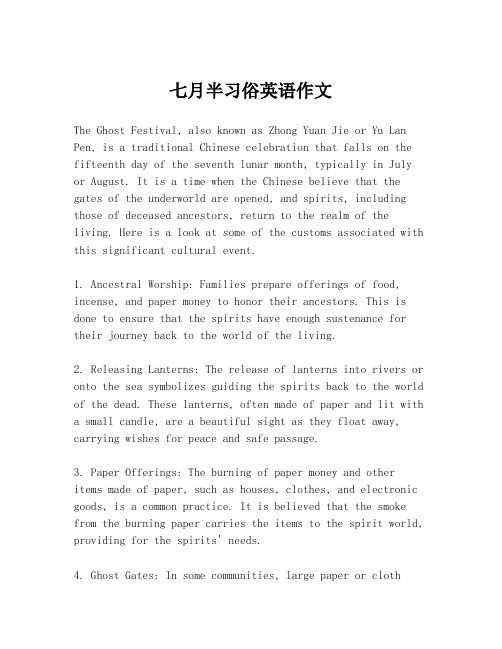
七月半习俗英语作文The Ghost Festival, also known as Zhong Yuan Jie or Yu Lan Pen, is a traditional Chinese celebration that falls on the fifteenth day of the seventh lunar month, typically in July or August. It is a time when the Chinese believe that the gates of the underworld are opened, and spirits, including those of deceased ancestors, return to the realm of the living. Here is a look at some of the customs associated with this significant cultural event.1. Ancestral Worship: Families prepare offerings of food, incense, and paper money to honor their ancestors. This is done to ensure that the spirits have enough sustenance for their journey back to the world of the living.2. Releasing Lanterns: The release of lanterns into rivers or onto the sea symbolizes guiding the spirits back to the world of the dead. These lanterns, often made of paper and lit with a small candle, are a beautiful sight as they float away, carrying wishes for peace and safe passage.3. Paper Offerings: The burning of paper money and other items made of paper, such as houses, clothes, and electronic goods, is a common practice. It is believed that the smoke from the burning paper carries the items to the spirit world, providing for the spirits' needs.4. Ghost Gates: In some communities, large paper or clothstructures called "ghost gates" are erected. These gates are symbolic entrances to the spirit world and are often decorated with intricate designs.5. Performing Opera and Music: Traditional opera and music performances are held to entertain the spirits and to attract them to the offerings. These performances can last for several days and are a significant part of the festival's celebrations.6. Feasting: A communal feast is often prepared, with an extra place setting at the table for any uninvited spirits who might join. This is a way of sharing the abundance of the living with the spirits.7. Visiting Temples: Many people visit temples to pray for the well-being of their deceased relatives and to ask for blessings from the deities.8. Avoiding Certain Activities: There are also certain customs to avoid during the Ghost Festival. For example, itis often advised not to swim, as it is believed that the spirits might pull one underwater, and not to walk alone at night to avoid unwanted encounters with wandering spirits.The Ghost Festival is not just about honoring the dead; it is also a time for the living to reflect on the cycle of life and death and to show respect for the spiritual realm. It is a complex blend of tradition, superstition, and familialpiety that continues to be an important part of Chinese culture.。
资源七月半河灯节作文
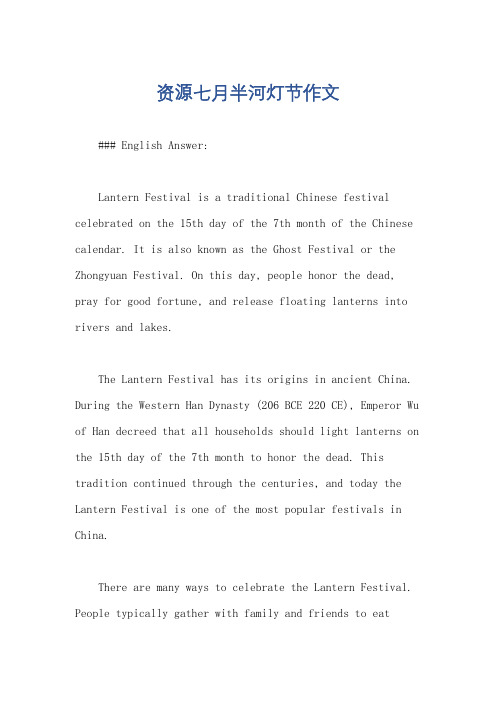
资源七月半河灯节作文### English Answer:Lantern Festival is a traditional Chinese festival celebrated on the 15th day of the 7th month of the Chinese calendar. It is also known as the Ghost Festival or the Zhongyuan Festival. On this day, people honor the dead, pray for good fortune, and release floating lanterns into rivers and lakes.The Lantern Festival has its origins in ancient China. During the Western Han Dynasty (206 BCE 220 CE), Emperor Wu of Han decreed that all households should light lanterns on the 15th day of the 7th month to honor the dead. This tradition continued through the centuries, and today the Lantern Festival is one of the most popular festivals in China.There are many ways to celebrate the Lantern Festival. People typically gather with family and friends to eattraditional foods, such as mooncakes and pomegranates. They also release floating lanterns into rivers and lakes. The lanterns are made of paper and bamboo, and they are often decorated with prayers and well wishes.The Lantern Festival is a time for reflection and remembrance. It is also a time to celebrate the beauty oflife and the hope of a better future.### 中文回答:七月半河灯节是华人在农历七月十五日会庆祝的一个传统节日。
中元节的英文介绍作文
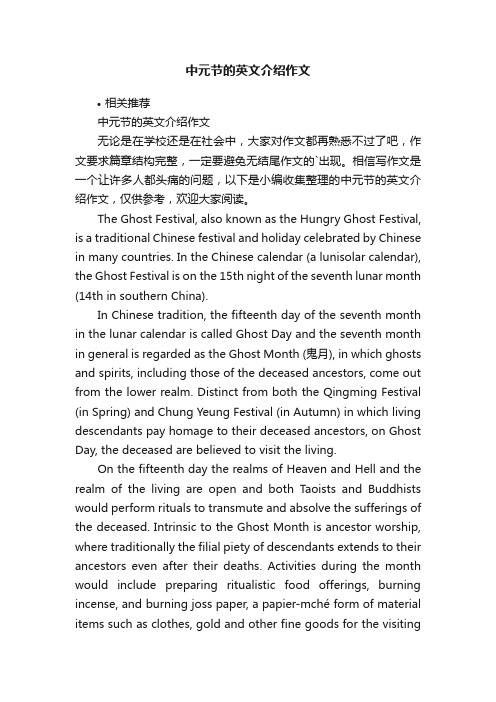
中元节的英文介绍作文•相关推荐中元节的英文介绍作文无论是在学校还是在社会中,大家对作文都再熟悉不过了吧,作文要求篇章结构完整,一定要避免无结尾作文的`出现。
相信写作文是一个让许多人都头痛的问题,以下是小编收集整理的中元节的英文介绍作文,仅供参考,欢迎大家阅读。
The Ghost Festival, also known as the Hungry Ghost Festival, is a traditional Chinese festival and holiday celebrated by Chinese in many countries. In the Chinese calendar (a lunisolar calendar), the Ghost Festival is on the 15th night of the seventh lunar month (14th in southern China).In Chinese tradition, the fifteenth day of the seventh month in the lunar calendar is called Ghost Day and the seventh month in general is regarded as the Ghost Month (鬼月), in which ghosts and spirits, including those of the deceased ancestors, come out from the lower realm. Distinct from both the Qingming Festival (in Spring) and Chung Yeung Festival (in Autumn) in which living descendants pay homage to their deceased ancestors, on Ghost Day, the deceased are believed to visit the living.On the fifteenth day the realms of Heaven and Hell and the realm of the living are open and both Taoists and Buddhists would perform rituals to transmute and absolve the sufferings of the deceased. Intrinsic to the Ghost Month is ancestor worship, where traditionally the filial piety of descendants extends to their ancestors even after their deaths. Activities during the month would include preparing ritualistic food offerings, burning incense, and burning joss paper, a papier-mché form of material items such as clothes, gold and other fine goods for the visitingspirits of the ancestors. Elaborate meals (often vegetarian meals) would be served with empty seats for each of the deceased in the family treating the deceased as if they are still living. Ancestor worship is what distinguishes Qingming Festival from Ghost Festival because the latter includes paying respects to all deceased, including the same and younger generations, while the former only includes older generations. Other festivities may include, buying and releasing miniature paper boats and lanterns on water, which signifies giving directions to the lost ghosts and spirits of the ancestors and other deities.The Ghost Festival is celebrated during the seventh month of the Chinese calendar. It also falls at the same time as a full moon, the new season, the fall harvest, the peak of Buddhist monastic asceticism, the rebirth of ancestors, and the assembly of the local community. During this month, the gates of hell are opened up and ghosts are free to roam the earth where they seek food and entertainment. These ghosts are believed to be ancestors of those who forgot to pay tribute to them after they died, or those who were never given a proper ritual send-off. They have long needle-thin necks because they have not been fed by their family, or as a punishment so that they are unable to swallow. Family members offer prayers to their deceased relatives, offer food and drink and burn hell bank notes and other forms of joss paper. Joss paper items are believed to have value in the afterlife,considered to be very similar in some aspects to the material world, People burn paper houses, cars, servants and televisions to please the ghosts. Families also pay tribute to other unknown wandering ghosts so that these homeless souls do not intrude on their lives and bring misfortune. A large feast is held for the ghosts on the fourteenth day of the seventh month, whenpeople brings samples of food and places them on an offering table to please the ghosts and ward off bad luck.In some East Asian countries today, live performances are held and everyone is invited to attend. The first row of seats are always empty as this is where the ghosts sit. The shows are always put on at night and at high volumes as the sound is believed to attract and please the ghosts. Some shows include Chinese opera, dramas, and in some areas, even burlesque shows. These acts are better known as "Merry-making".For rituals, Buddhists and Taoists hold ceremonies to relieve ghosts from suffering, many of them holding ceremonies in the afternoon or at night (as it is believed that the ghosts are released from hell when the sun sets). Altars are built for the deceased and priests and monks alike perform rituals for the benefit of ghosts. Monks and priests often throw rice or other small foods into the air in all directions to distribute them to the ghosts.During the evening, incense is burnt in front of the doors households. Incense stands for prosperity in Chinese culture, so families believe that there is more prosperity in burning more incense.[4]During the festival, some shops are closed as they want to leave the streets open for the ghosts. In the middle of each street stands an altar of incense with fresh fruit and sacrifices displayed on it.Fourteen days after the festival, to make sure all the hungry ghosts find their way back to hell, people flow water lanterns and set them outside their houses (a practice that can be found amongst the Japanese during Obon). These lanterns are made by setting a lotus flower-shaped lantern on a paper boat. The lanterns are used to direct the ghosts back to the underworld, and when they go out, it symbolizes that they have found theirway back.。
中元节英语介绍

中元节英语介绍The Mid-Autumn Festival, also known as the Zhongyuan Festival, is a traditional Chinese festival celebrated on the 15th day of the8th lunar month. It is one of the most important festivals in Chinese culture and holds great significance for families and friends to come together.During the festival, people gather with their loved ones to appreciate the full moon and pray for a good harvest and blessings. It is believed that the moon is at its brightest and roundest on this day, symbolizing unity and completeness.One of the highlights of the Mid-Autumn Festival is mooncakes. These round pastries are filled with sweet or savory fillings such as lotus seed paste, red bean paste, or egg yolk. Mooncakes are often given as gifts to family members and friends as a token of reunion and good wishes.Another tradition of the Mid-Autumn Festival is lanterns. Children and adults alike enjoy carrying and admiring brightly colored lanterns during the night. Lanterns come in various shapes and designs, adding a festive atmosphere to the celebration.In addition to mooncakes and lanterns, the Mid-Autumn Festival also features activities such as dragon and lion dances, live performances, and storytelling. Cultural events and fairs are organized in many cities and towns, providing opportunities for people to experience the traditional customs and enjoy the festive atmosphere.Overall, the Mid-Autumn Festival is a time for reunion, reflection, and gratitude. It is a joyous occasion for families and friends to come together, appreciate the beauty of the moon, and cherish their relationships.。
有关介绍中元节的英语作文

介绍中元节的英语作文有关介绍中元节的英语作文导语:中元节,俗称鬼节、施孤、七月半,佛教称为盂兰盆节。
与除夕、清明节、重阳节三节是中国传统的祭祖大节,也是流行于汉字文化圈诸国的传统文化节日。
Just as Halloween is for Americans, the “Hungry Ghost Festival” is for Chinese. Ghost Festival is one of Chinese traditional occasions, which is taken very seriously by the Chinese. This festival usually falls on the15th day of the 7th month of the lunar calendar. The Ghost Festival, some places say the Hungry Ghost Festival, is also called Half July (Lunar), Ullambana, which is closely related to Buddhism, and zhongyuan jie which is the Taoism saying and Folk Belief.就像万圣节对于美国人一样,中国也有鬼节。
鬼节是中国传统节日之一,并且被中国人认真看待。
这个节日通常是阴历七月十五。
鬼节(有些地方翻译为饿鬼节),又叫七月半,佛教称之为盂兰盆节,中元节是道教的称法,同时也是一种民间说法。
It is believed by the Chinese that the dead become ghosts roaming between Heaven and Earth unless they have descendants to care for them during the Ghost Festival. During this month, the gates of hell are opened to free the hungry ghosts who then wander to seek food on Earth. Some even think that the ghosts would seek revenge on those who had wronged them in their lives. However, more people remember their ancestors on this day. The Ghost Festival becomes a time for remembering the importance of filial piety. The reason why the Chinese celebrate this festival is to remember their dead family members and pay tribute to them. They also feel that offering food to the deceased appeases them and wards off bad luck.People now release river lights as an important activity during this time, since it is said that river light can comfort and warm the homeless ghosts. In some areas, visitors may also see small roadside fires, where believes burn paper money and other offerings to appease the restless spirits who have temporarily been released from Hades.中国人认为除非一个人有子孙后代能够在他死后在鬼节这天悼念他们,否则人死后会变成鬼魂在天地之间游荡。
中国四大传统节日英文介绍分析

中国四大传统节日:春节,中秋节,端午节,清明节元宵节The Lantern Festival (元宵节) is the last day of the Chinese New Year celebration. This day is for the last moment for setting off fireworks, the last excuse for eating a big feast and the last chance for family getting together before the “年” celebrations are over. (Latern Festival is also a traditional time of celebration for foreigners who live in China). The Lantern Festival, the 15th of the first month of the lunar calendar, is the first full moon of the year. Celebrations and traditions on this day date back to the Western Han Dynasty. Traditions for this festival: as the name indicates, hanging and looking at lanterns is the main tradition. Lanterns of various shapes and sizes are displayed on trees, or along river banks. Parents often take their children to Lantern Fairs and sometimes lucky kids even get a mini toy lantern. Another tradition is guessing lantern riddles. These are riddles that are hung on lanterns for people to shoot down and solve. The riddles are usually short, wise, and sometimes humorous. The answer to a riddle can be a Chinese character, a famous person's name, a place name or a proverb. This tradition has become apopular game with serious staying power even as social development changes other traditions. Other than that, the most important thing to do today is to eat sweet dumplings. In northern China, sweet dumplings made of glutinous rice flour are called “元宵” while in southern part they are called “汤圆”. Typical sweet dumplings are filled with black sesame sauce, sweetened bean paste, or hawthorn. Making “元宵” today is like a game or an activity, so it's seldom done without a reason and a group of friends or family present to help out.端午节The Dragon Boat Festival, also called the Duanwu Festival, is celebrated on the fifth day of the fifth month according to the Chinese calendar. For thousands of years, the festival has been marked by eating zong zi (glutinous rice(糯米)wrapped to form a pyramid using bamboo or reed leaves) and racing dragon boats. The festival is best known for its dragon-boat races, especially in the southern provinces where there are many rivers and lakes. Thisregatta(赛舟会)commemorates the death of Qu Yuan , an honest minister who is said to have committed suicide by drowning himself in a river. Qu was a minister of the State of Chu situated in present-day Hunan and Hubei provinces, during theWarring States Period(475-221BC)(战国时期). He was upright, loyal and highly esteemed for his wise counsel that brought peace and prosperity to the state. However, when a dishonest and corrupt prince vilified Qu, he was disgraced and dismissed from office. Realizing that the country was now in the hands of evil and corrupt officials, Qu grabbed a large stone and leapt into the Miluo River on the fifth day of the fifth month. Nearby fishermen rushed over to try and save him but were unable to even recover his body. Thereafter, the state declined and was eventually conquered by the State of Qin. The people of Chu who mourned the death of Qu threw rice into the river to feed his ghost every year on the fifth day of the fifth month. But one year, the spirit of Qu appeared and told the mourners that a hugereptile(爬行动物)in the river had stolen the rice. The spirit then advised them to wrap the rice in silk and bind it with five different-colored threads before tossing it into the river. During the Duanwu Festival, a glutinous rice pudding called zong zi is eaten to symbolize the rice offerings to Qu. Ingredients such as beans,lotus seeds(莲子), chestnuts(栗子), pork fat and the golden yolk of a salted duck egg are often added to the glutinous rice. The pudding is then wrapped with bamboo leaves, bound with a kind of raffia and boiled in salt water for hours. The dragon-boat races symbolize the many attempts to rescue and recover Qu's body. A typical dragon boat ranges from 50-100 feet in length, with a beam of about 5.5 feet, accommodating two paddlers seated side by side. A wooden dragon head is attached at the bow, and a dragon tail at thestern(船尾).A banner hoisted on a pole is also fastened at the stern and the hull is decorated with red, green and blue scales edged in gold. In the center of the boat is a canopied shrine behind which the drummers,gong(铜锣)beaters andcymbal(铙钹)players are seated to set the pace for the paddlers. There are also men positioned at the bow to set off firecrackers, toss rice into the water and pretend to be looking for Qu. All of the noise and pageantry creates an atmosphere of gaiety and excitement for the participants and spectators alike. The races are held among different clans, villages and organizations, and the winners are awarded medals, banners, jugs of wine and festive meals.清明节Qing Ming is a time to remember the dead and the dearly departed. More important, it is a period to honour and to pay respect to one's deceased ancestors and family members. Because it reinforces the ethic of filial piety, Qing Ming is a major Chinese festival.Literally meaning "clear" (Qing) and "bright" (Ming), this Chinese festival falls in early spring, on the 106th day after the winter solstice. It is a "spring" festival, and it is an occasion for the whole family to leave the home and to sweep the graves of their forebears. Chinese being practical people this sweeping of the graves is given an extended period, that is, 10 days before and after Qing Ming day. Among some dialect groups a whole month is allocated. 清明节是一个纪念祖先的节日。
- 1、下载文档前请自行甄别文档内容的完整性,平台不提供额外的编辑、内容补充、找答案等附加服务。
- 2、"仅部分预览"的文档,不可在线预览部分如存在完整性等问题,可反馈申请退款(可完整预览的文档不适用该条件!)。
- 3、如文档侵犯您的权益,请联系客服反馈,我们会尽快为您处理(人工客服工作时间:9:00-18:30)。
中国四大鬼节之一七月半或中元节英语介绍万圣节是西方的鬼节,那你知道中国的四大鬼节是那四个节日吗?今天介绍中国四大鬼节之一七月半,俗称鬼节,又称中元节或盂兰盆节。
民间有阳间过元宵节阴间过鬼节的传说,因此鬼节是阴间最大的节日。
你知道怎样向外国朋友介绍中国的鬼节吗?随小编一起来看看吧!There are many ghosts in Chinese culture; they have been worshipped by the Chinese for a few thousand years. Even Confucius said, "Respect ghosts and gods, but keep away from them."While many people believe in ghosts, there are others who don't. The Chinese people often say, "If you believe it, there will be, but if you don't, there will not."The ghost is a classical image in Chinese culture, i.e., the young woman whose face is covered by long black hair, who dies due to misfortune, then comes back for revenge.The word "ghost" for many Chinese conjures up similar images. Often the ghost is a beautiful young woman. The sudden switch from a beautiful girl to a frightening ghost is striking. The seemingly fragile, helpless and beautiful women turning into fearless killers is a favorite theme among Asian movie directors and storywriters.Chinese Ghost FestivalJust as the West features Halloween for ghosts and ghouls, the Chinese have a holiday to honor the departed spirits of the underworld -- the Chinese Ghost Festival. It is said that ghosts roam the world every year for one lunar month. In some areas of China, visitors can see small roadside fires, where believers burn paper money and other offerings to appease the restless spirits that have temporarily been released from Hades.The Chinese Ghost Festival is also called "Half July" (Lunar). It is a popular occasion celebrated throughout China on the 15th day of the seventh lunar month.Historically, families offer sacrifices of the newly harvested grain to departed ancestors on this day, which also coincides with the Buddhist Ullambana (Deliverance) Festival and the Taoist Chinese Ghost Festival. Since each of these traditions in some way honors the spirits of thedeparted, the seventh lunar month has come to be known as "Ghost Month" and is a time when the "Good Brethren" (ghosts from the underworld) come back to earth to feast on the victuals offered by the living. Over time the Ullambana Festival and Ghost Festival have melded together to become the present-day Chung Yuan Putu or "Mid-origin Passage to Universal Salvation."The Chinese believe that the dead become ghosts between heaven and earth. Spirits without descendants to care for them are summoned during the Ghost Festival so that they may also enjoy the warmth of life among the living. This custom -- an extension of the traditional Chinese ethic of "universal love" -- has been woven together with the didactic legend, "Moginlin Saving His Mother From Hades." It lends the Ghost Festival a positive spin as a time for remembering the importance of filial piety. People now have inherited releasing river light as an important activity. It is said that river light can comfort and warm homeless ghosts.Burial of the deadIn the past, the burial of the dead (cremation is traditionally uncommon) was a matter taken very seriously in Chinese society. Improper funeral arrangements could wreak ill fortune and disaster upon the family of the deceased.To a certain degree, Chinese funeral rites and burial customs were determined by the age of the deceased, the manner of his/her death, his/her status and position in society and his/her marital status.According to Chinese custom, an older person should not show respect to someone younger. Thus, if the deceased was a young bachelor his body could not be brought home but was left at the funeral parlor and the parents could not offer prayers for their son. Since the deceased was unmarried he had no children to perform the rites, which was why the body did not enter the family home. If a baby or child died no funeral rites were performed since respect could not be shown to a younger person. The child was, therefore, buried in silence.Chinese funeral rites for an elderly person must follow the prescribed form and convey the relevant rites that befit the person.Chinese thoughts towards life after deathYoung women in traditional societies are rarely endowed with much power, and malignant powers are only summoned with keen hatred and a desire for revenge. The more badly one is wronged, the more powerful he or she becomes after death.Such beliefs are closely related to the Chinese attitude towards life after death -- a combination of superstition and religion.Buddhist doctrines about the life cycle led to many vivid descriptions in Chinese legends about karma. For example, Buddhism forbids murder; in folklore, people believe that butchers return in the next life in the form of the animals they killed. People who treat others badly or do cruel things become pathetic beings, suffering for the rest of the next life.Besides retribution in lives to come, vivid and complicated descriptions of heaven and hell also exist in Chinese legends.People have imaginatively transfigured their real life experiences into visions of the unknown world. The Chinese legendary hell, for example, is governed by a king in a completely bureaucratic system.The king of the underground takes charge of people's lives, keeping a book that spells out the exact time of everybody's death.In the classic novel, Pilgrimage to the West, the Monkey King Wu Kong goes to visit the king of hell and reads the book of death. He looks for his own name and erases it, ensuring himself everlasting life.。
